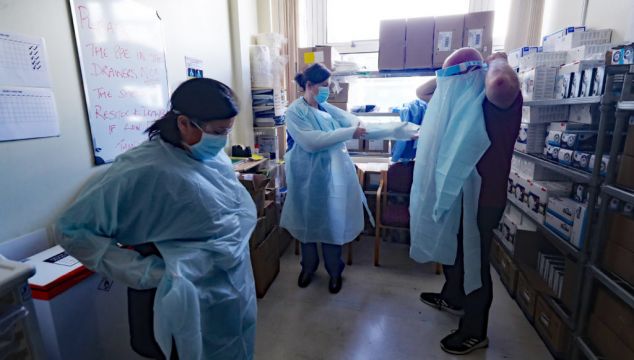Hospitals, schools and child protection services are being hit by major staff shortages as coronavirus infections driven by the Omicron variant impact across society.
Some schools are preparing to reopen with just 50 per cent of their staff, while more than 1,000 workers are on Covid-related leave in a western hospital group and close to 10 per cent of Tusla staff are absent.
The president of the Irish Primary Principals’ Network (IPPN) expressed concern that a number of schools will reopen with just half of their teachers on Thursday, with 40 per cent of schools reporting insufficient staff to reopen all classes.
Brian O’Doherty told RTÉ radio’s Today show that the IPPN conducted a survey of members to which 1,500 schools responded, about half the primary schools in the country.
This found that half of the schools that responded were facing staff shortages of 20 per cent, with eight per cent of schools facing more than a 50 per cent shortage due to Covid.
Mr O'Doherty said boards of management will have to make decisions, such as the necessity for some classes to be conducted remotely.
Hospital group
Meanwhile, Saolta healthcare group chief executive Tony Canavan said there are 1,200 staff on Covid-related leave in hospitals across Galway, Mayo, Donegal, Roscommon and Sligo, representing 11 per cent of the group’s total workforce.
Mr Canavan told RTÉ radio’s Morning Ireland that Covid-related absences across the hospital group were "really quite alarming".
“In the middle of last week we had a quick look at the numbers post Christmas and across the whole group there were a couple of hundred staff out on Covid-related leave at that time," he said. "Between Tuesday and Wednesday of last week and the end of the week that number escalated quite considerably."
The escalation in the number of Covid patients has led the group to introduce a ban on visitors, which Mr Canavan described as a “very significant move."
The situation has deteriorated quite quickly and quite badly
“This morning we've 162 patients across the regions who are Covid positive and that has risen very rapidly from just before Christmas, on Christmas Eve we had only 53. The situation has deteriorated quite quickly and quite badly," he said.
Mr Canavan said managing both urgent, Covid and elective care was a challenge for hospital staff.
“This time last year pretty much all our services were closed down and we were focusing just on Covid-19 patients, now Emergency Departments are very busy, our wards are busy, unfortunately we are returning again to patients awaiting admission on trolleys in our Emergency Departments - there is a much greater throughput of people through our hospitals, so our hospitals are extremely busy any way and the impact of Covid-19 on top of that is really very significant," he said.
“Every available space that we have is being used on all hospital sites – but a space or a bed is only of use for patients if you have staff to look after them and that's becoming a problem on some sites.
“Ambulance delays are a feature again unfortunately, particularly in areas like Letterkenny, Sligo and Galway where we have significant delays in excess of an hour on average for ambulances to offload their patients.
“Staff stretch themselves to ensure patients are looked after, but there are some situations where wards are closed and we can't admit patients as we don't have staff.
“We’ve restricted all elective work across the group to the bare minimum and only the most important cases are getting in at this stage - they would be cancer cases or time sensitive cases."
Child protection services
Beyond the health service, Covid-related absences are also impacting on other services such as Tusla, the child protection agency.
Tusla chief executive Bernard Gloster told RTÉ radio’s Today show that there were 436 Tusla staff on Covid-related leave on Tuesday, 180 of whom were confirmed positive cases. That was “almost ten per cent” of the agency’s workforce.
The percentages of those absent varies from location and county to county, he said. But the problem was acute in 24-hour facilities, some of which were experiencing 30 per cent to 40 per cent staff shortages due to Covid-19.
Tusla already operated under the HSE’s derogation rule, he said, which had been applied “in 20 situations so far”.
He warned that the cancelling of annual leave for some staff will have to be considered in the coming weeks, as the number of cases of Covid continues to rise.

Throughout the pandemic Tusla had three priorities, Mr Gloster said: frontline child protection dealing with 200 referrals per day, support for the 6,000 children in care and support for children in domestic violence situations.
The closure of schools last year had meant that many of the usual supports for vulnerable children, their “safety nets”, had been taken away. The decrease in referrals from schools had led to an increase in referrals from the gardaí and domestic violence protection providers.
The focus of concern had changed, he said, and he echoed the concerns expressed by the Rapporteur on Children, the Children’s Ombudsman and the Children’s Rights Alliance on the impact of school closures on children.







